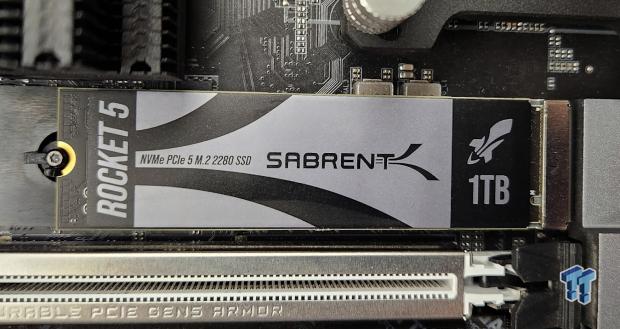
The Bottom Line
Pros
- Gaming
- Throughput
- User experience
- PS5 compatible
Cons
- None
Should you buy it?
AvoidConsiderShortlistBuyIntroduction & Drive Details
For the storage giant Sabrent, 2024 marks its return to SSD prominence. Sabrent started out 2024 by delivering to us our first real taste of retail-ready 14,000 MB/s storage goodness via its 4TB Rocket 5 PCIe Gen5 Rocketship. Next up, we got a taste of the fastest of Sabrent's fastest when we tested its Rocket 5 2TB. Both of those speed demons exceeded expectations by delivering the highest and second-highest real-world performance we've encountered to date at their respective capacity points.
Now as you might imagine, 2TB and 4TB capacity points are the most desirable for avid gamers. However, the cost for entry into the next level of storage performance, that is PCIe Gen5, at those capacity points is rather steep to be sure. This is why we are so intrigued by the subject of today's review - Sabrent's Rocket 5 at the more affordable 1TB capacity point.
At first glance, when looking at any current Phison E26-controlled SSD's spec sheet and seeing lower random and sequential up to specs for the 1TB capacity point vs. the 2TB and 4TB capacity points, one would logically assume that you are giving up a significant amount of performance by going with the more affordable 1TB model. However, and somewhat surprisingly, this is not the case whatsoever, as we will demonstrate firsthand to you today.
Sabrent's Rocket 5 SSDs are fully optimized for Microsoft's DirectStorage API, can downshift PCIe Link-State if thermal thresholds are being exceeded, and finally are PlayStation 5 compatible when used in conjunction with Sabrent's own ingenious PS5 heatsink.
Sabrent has taken a different approach to its PCIe Gen5 performance flagship offering than many of its competitors in the PCIe Gen5 space. The Rocket 5 is sold as a bare drive only, leaving the required thermal mitigation to the end-user. We prefer this approach as it keeps costs down, and there is no voiding the warranty or damaging the drive if you prefer to remove an included thermal solution, opting instead to use the motherboard-supplied thermal solution.
Half the price and lacking nothing in terms of real-world performance, may be just what some of you have been waiting for to take the plunge. Now let's get into the numbers.
Drive Details
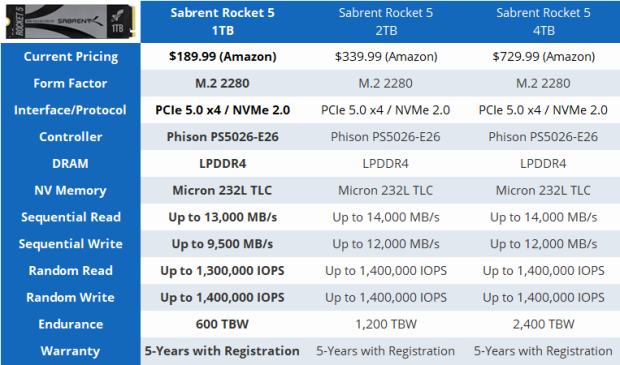
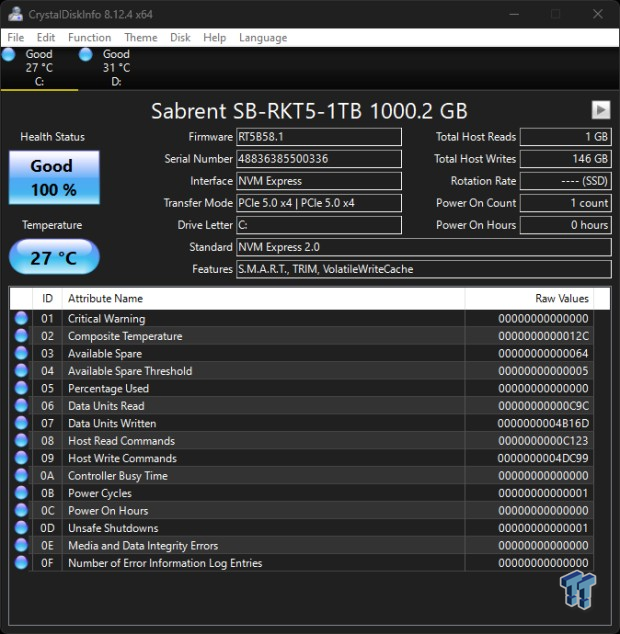
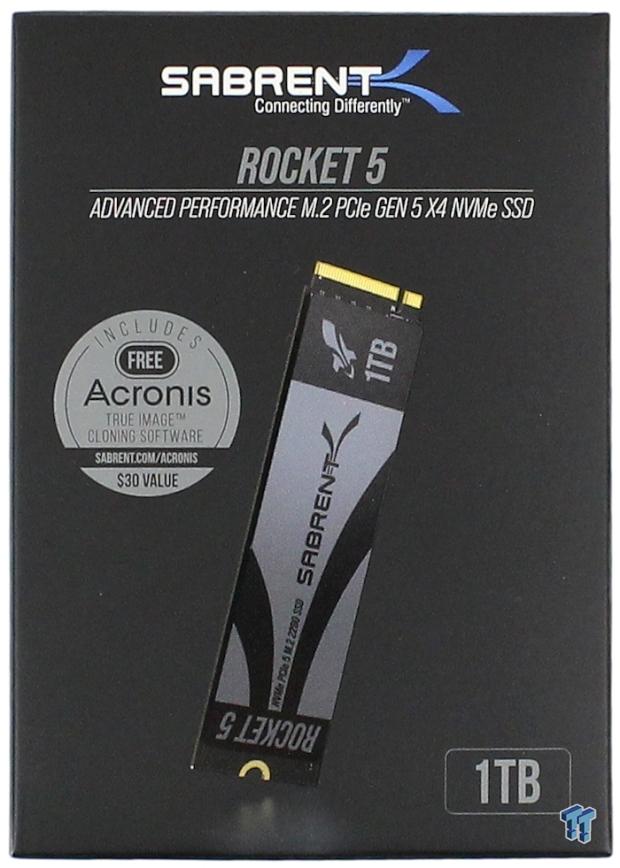
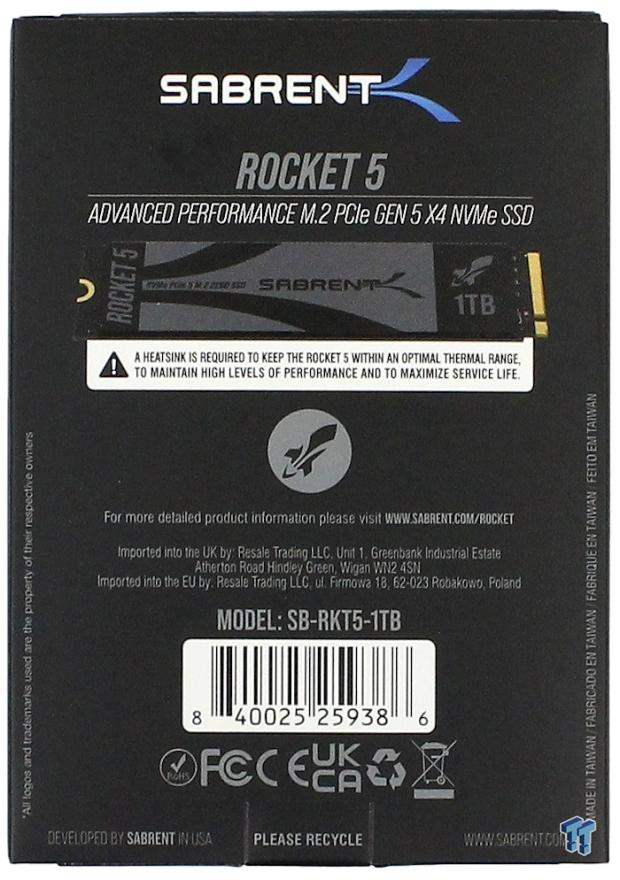


Like all Sabrent SSDs, the Rocket 5 is supported by Sabrent's own free SSD toolbox software, Rocket Control Panel, enabling convenient features such as device registration and firmware updates directly from your desktop. Get it HERE. Additionally, Sabrent offers free Acronis cloning software to complement its Rocket 5 SSDs. Get it HERE.
Jon's Test System Specifications
Intel Test System
- Motherboard: GIGABYTE AORUS Z790 Xtreme X
- CPU: Intel Core i9-14900K - Buy from Amazon
- Cooler: Alphacool Eissturm Hurricane Copper 45 - Buy from Amazon
- RAM: Patriot Viper Xtreme 5 8000 48GB - Buy from Amazon
- Graphics Card: MSI SUPRIM X RTX 3080 12GB - Buy from Amazon
- Case: PrimoChill's Praxis Wetbench - Buy from Amazon
- Power Supply: be quiet! Dark Power Pro 12 1200W - Buy from Amazon
- OS: Microsoft Windows 11 Pro 64-bit - Buy from Amazon
AMD Test System
- Motherboard: GIGABYTE X670E AORUS Master
- CPU: AMD Ryzen 9 7950X - Buy from Amazon
- Cooler: Alphacool Eissturm Hurricane Copper 45 - Buy from Amazon
- RAM: Sabrent Rocket DDR5 32GB - Buy from Amazon
- Graphics Card: MSI SUPRIM X RTX 3080 12GB - Buy from Amazon
- Case: PrimoChill's Praxis Wetbench - Buy from Amazon
- Power Supply: be quiet! Dark Power Pro 12 1200W - Buy from Amazon
- OS: Microsoft Windows 11 Pro 64-bit - Buy from Amazon
Because we at TweakTown like to be first at everything whenever we can, we will present our storage performance results for the test subject on both 14th Gen Intel and 7000 Series AMD platforms going forward for the foreseeable future. Because Intel still delivers the best real-world storage performance, (Look Here), our running chart will continue to be Intel-based until AMD can deliver better real-world storage performance than its rival.
| Today | 7 days ago | 30 days ago | ||
|---|---|---|---|---|
| $189.99 USD | - | |||
|
* Prices last scanned on 11/9/2024 at 3:56 pm CST - prices may not be accurate, click links above for the latest price. We may earn an affiliate commission from any sales.
|
||||
Sony PlayStation 5 - M.2 Storage Expansion
PS5 Read Performance
With Sony's wildly popular PlayStation 5 console now enabled for M.2 NVMe SSDs to be used as fast storage expansion, we include results for PS5 compatible SSDs we test as a part of our reviews going forward.
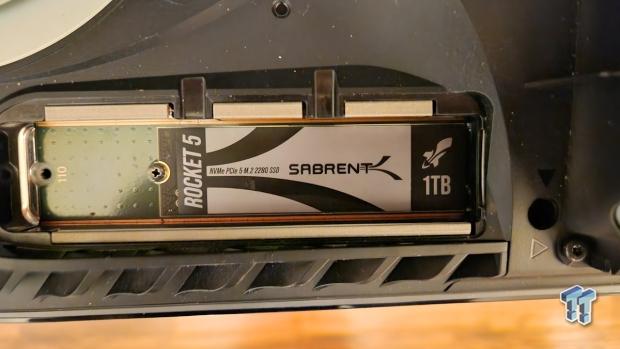
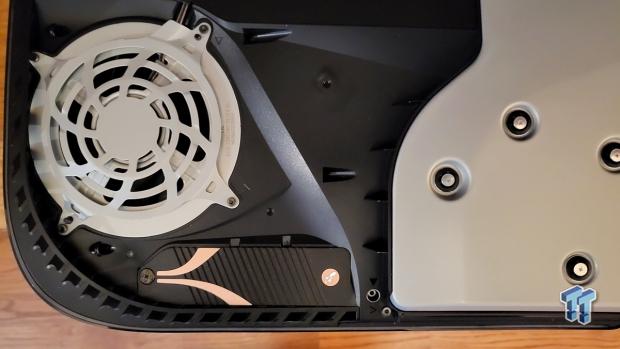
For SSDs that don't have an adequately sized PS5 compatible heatsink or other SSDs where the heatsink provided doesn't fit right and can be removed, we both use and recommend Sabrent's unparalleled PS5 heatsink available HERE.
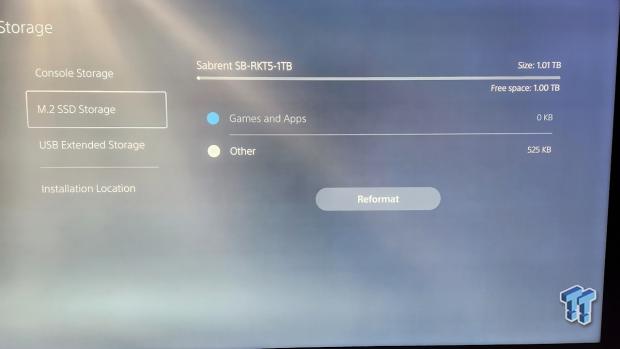
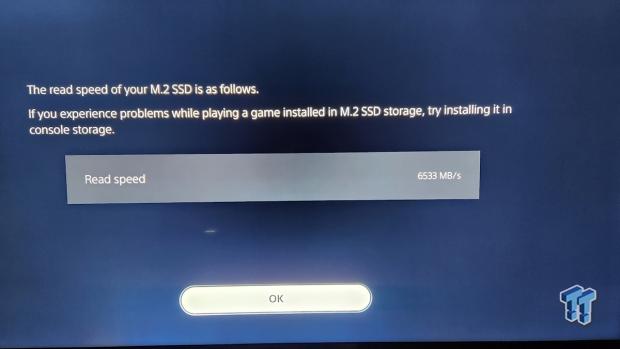
We only chart SSDs that can deliver a minimum of 5,500 MB/s read, which is Sony's original recommendation.
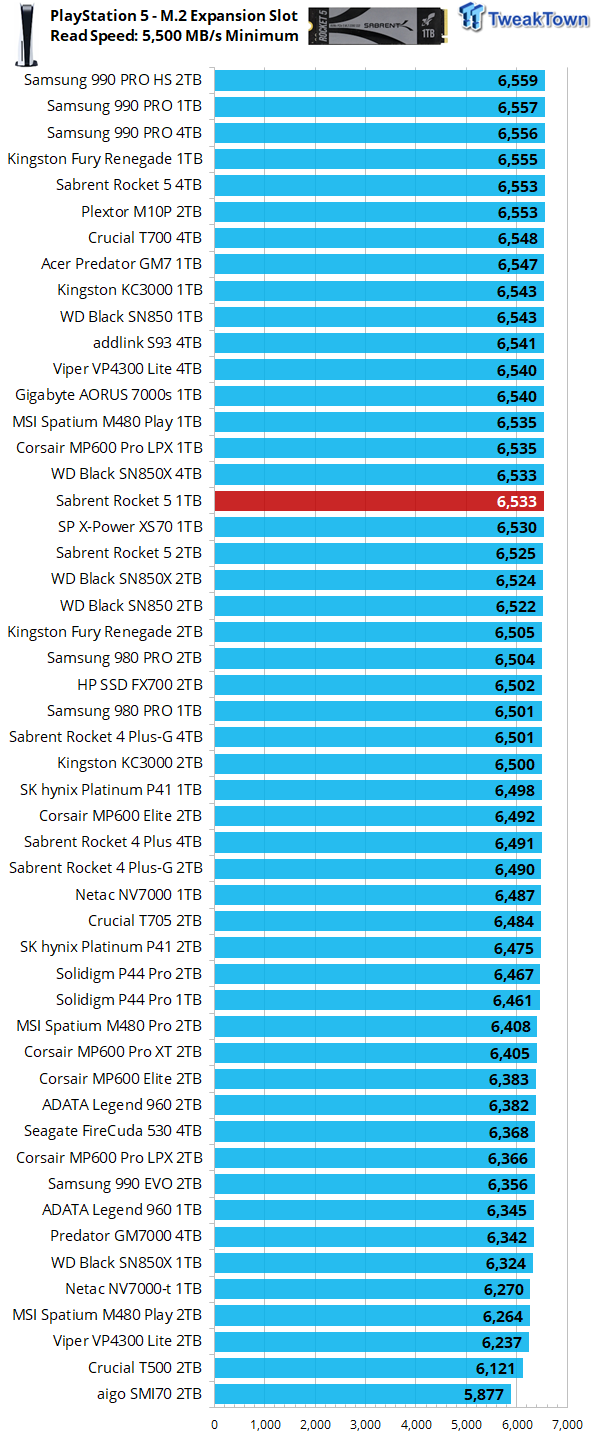
6,533 MB/s is right in there with the best of them.
Synthetic Benchmarks: CDM, Anvil, ATTO
CrystalDiskMark
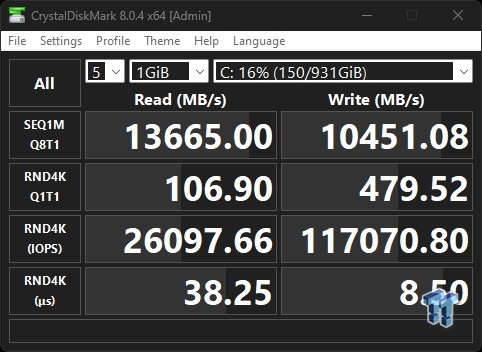
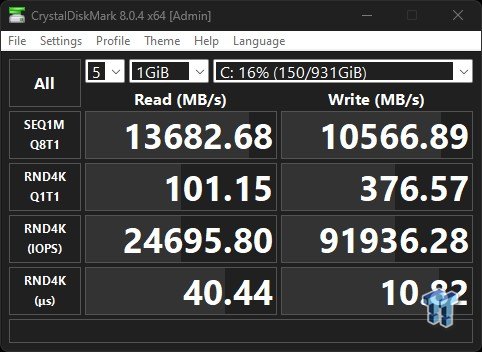
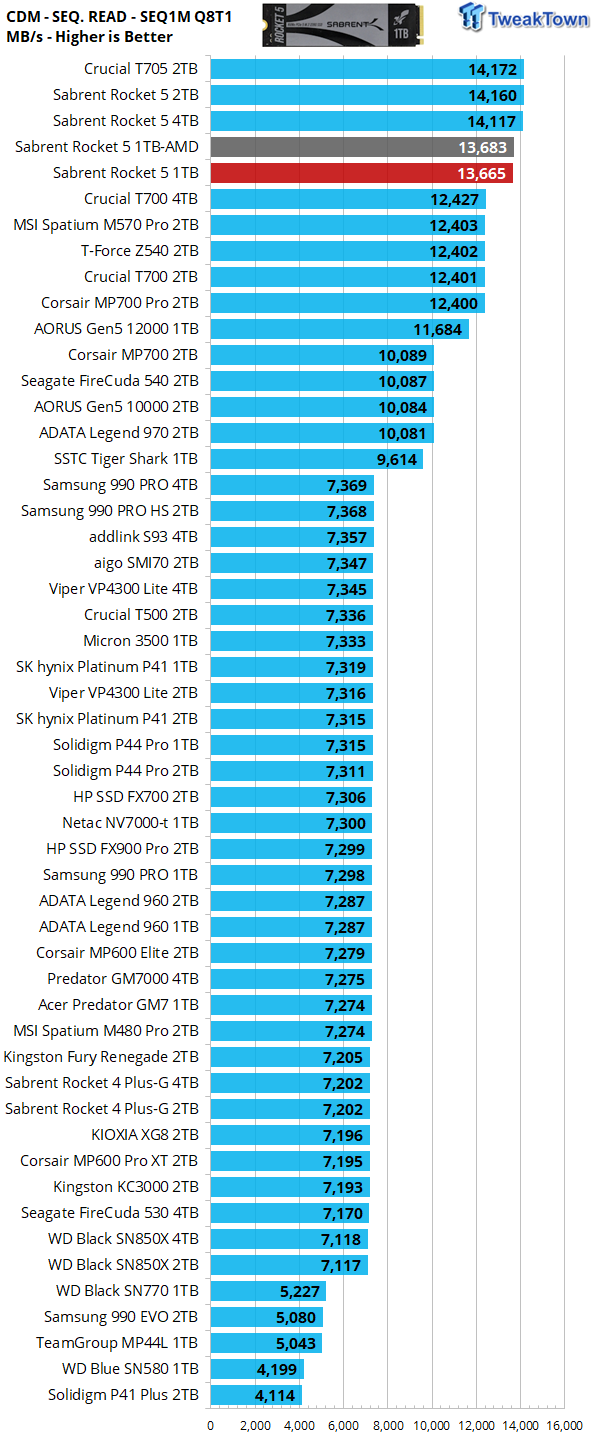
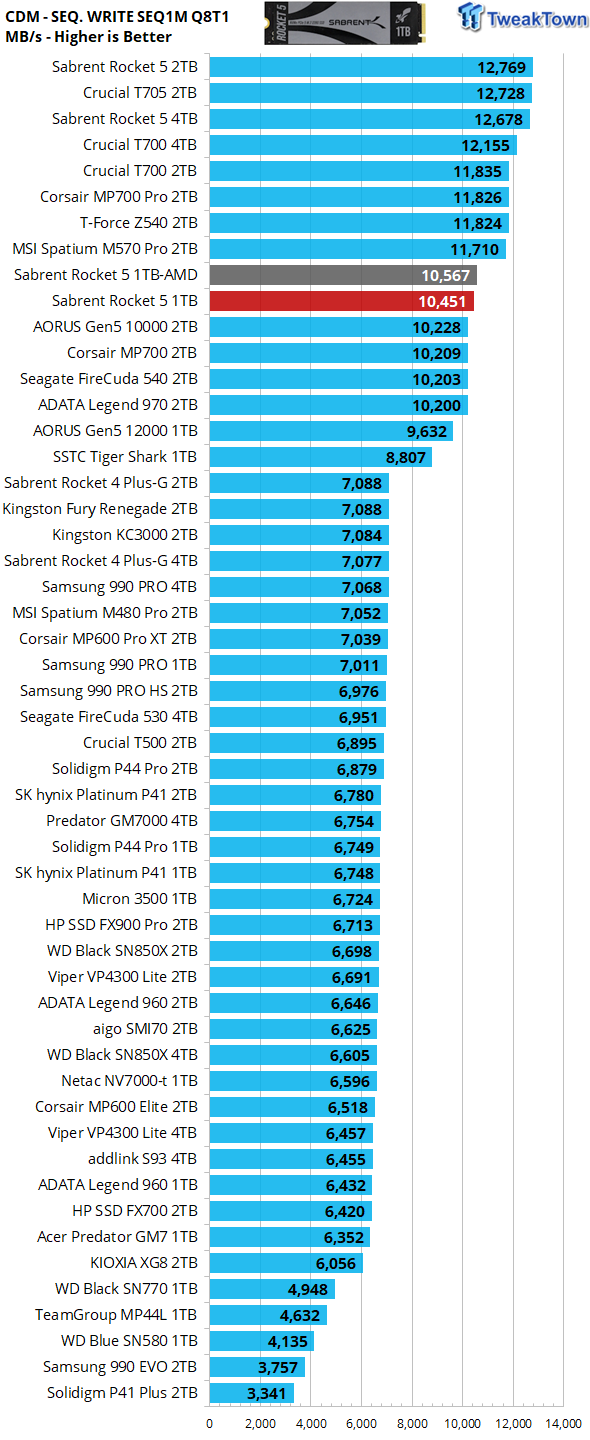
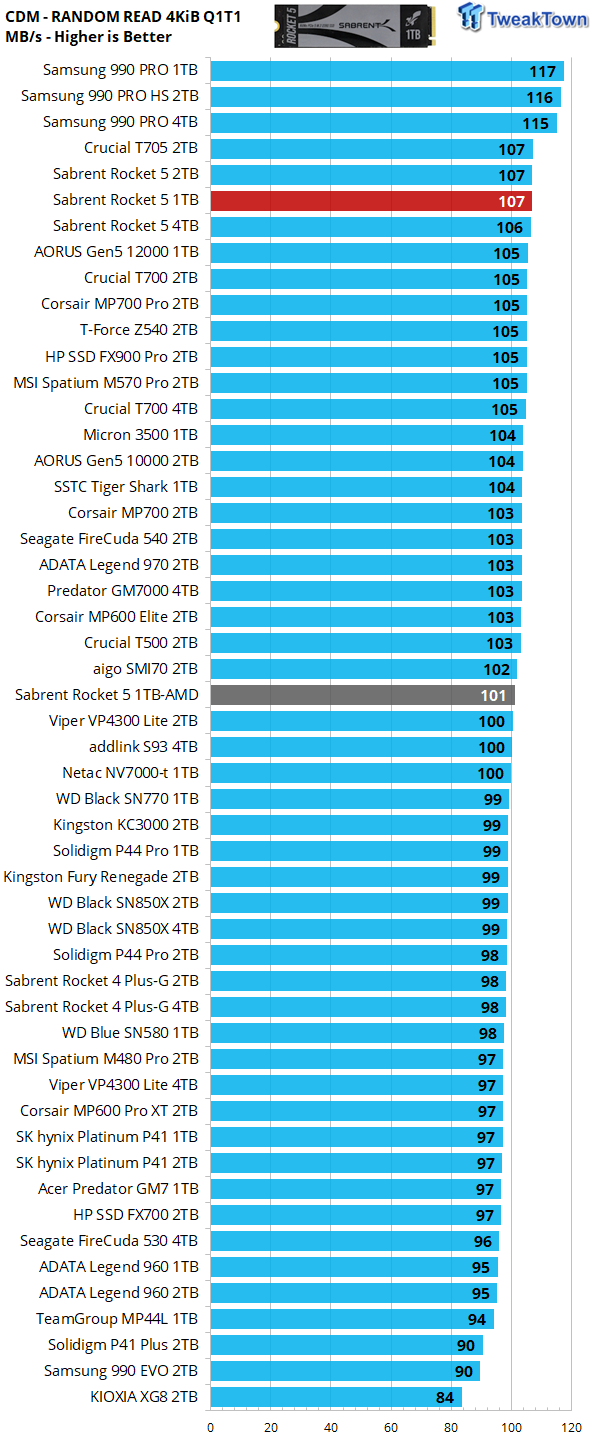
We employ CDM as our standard measurement for both sequential throughput and Q1T1 random read. In terms of sequential throughput, we find our test subject fully capable of exceeding quoted up to factory sequential performance specifications, both of which are significantly lower than the 4TB model. However, where it really matters, 4K Q1T1 read, our 1TB test subject delivers a bit more than its 4TB sibling.
Anvil's Storage Utilities
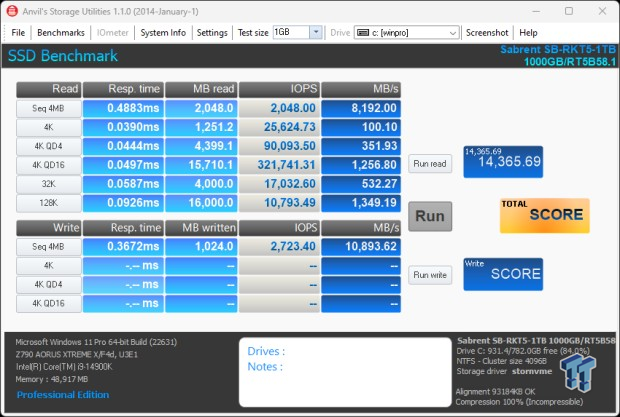
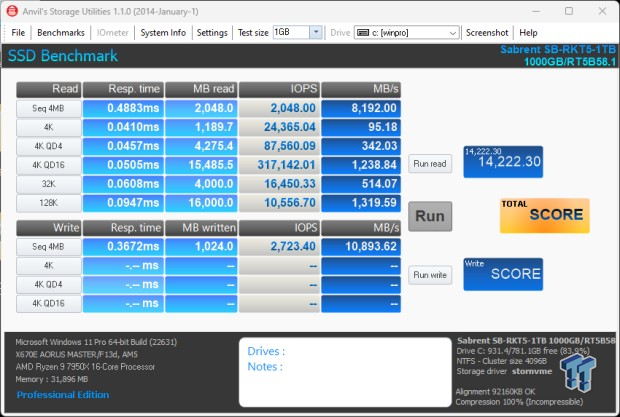
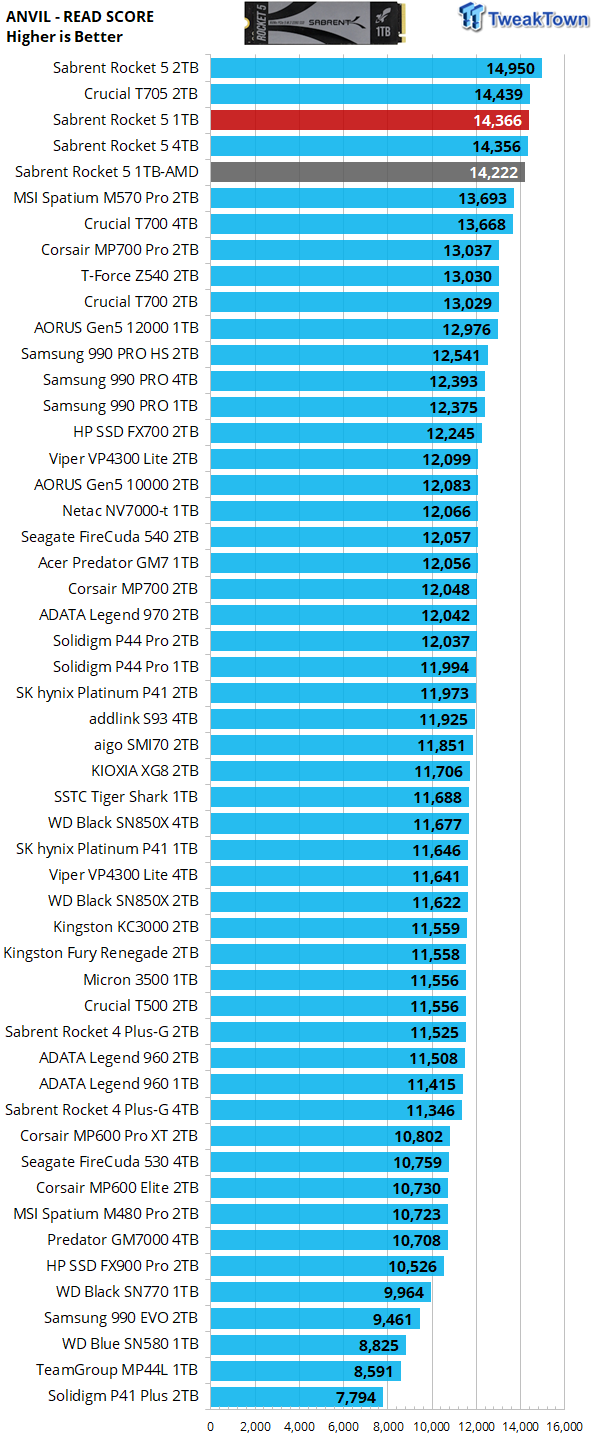
A read score of 14,366 is good for the third-best performance we've recorded to date and best-ever for a 1TB flash-based SSD. This is especially impressive as we find the 1TB Rocket 5 delivering even more than its 4TB sibling can, even though it is spec'd as lower performing.
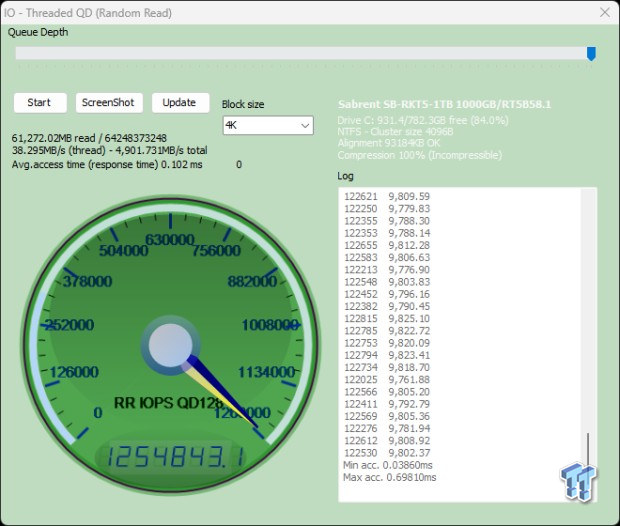
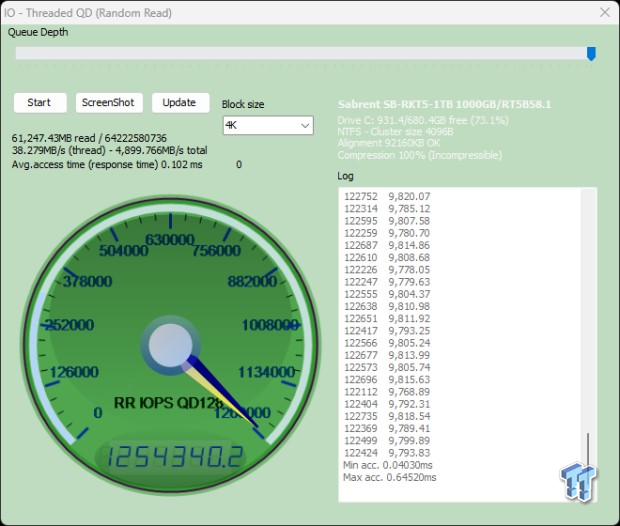
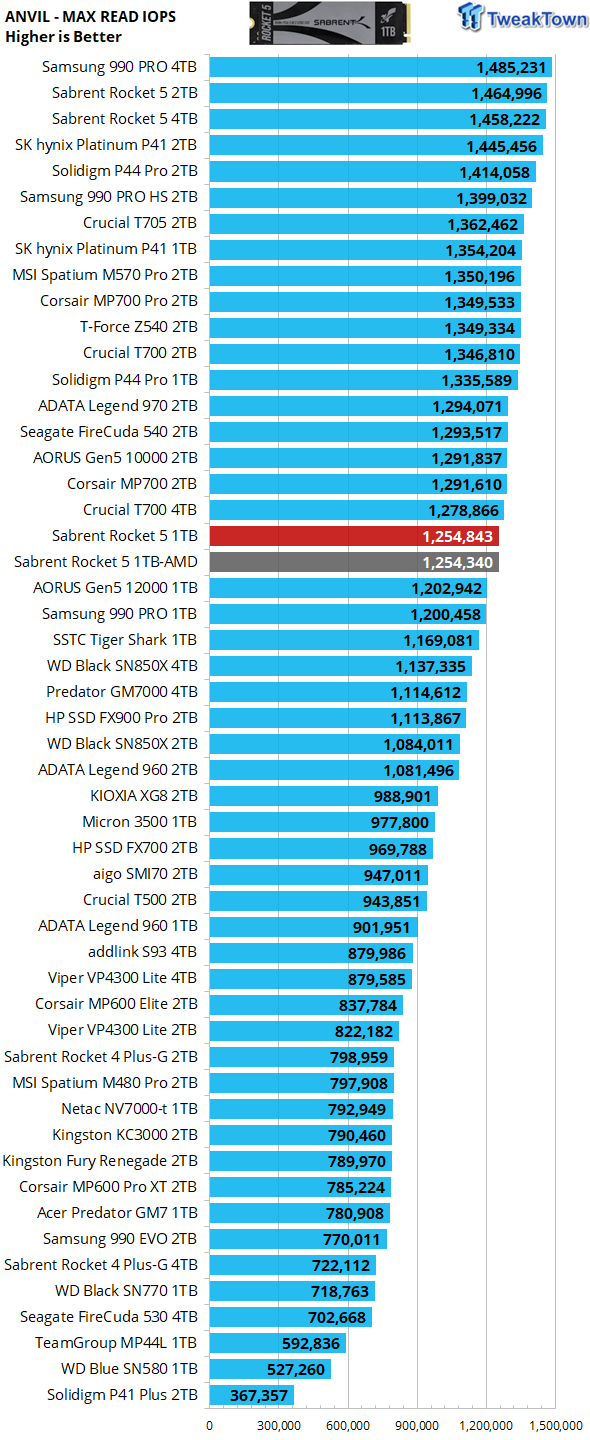
We employ Anvil's random read test as our standard for measuring max random read IOPS. This test is very accurate as it at its core is Iometer skinned over. We test at QD128. At 1.25 million RR IOPS, the 1TB Rocket 5 is indeed lagging behind the 2TB and 4TB models, but this is at a queue depth that is completely out of reach for consumers, so it doesn't matter one bit. A perfect example of this can be found at the top spot on this chart, which is currently occupied by an overall much lower-performing Gen4 SSD.
ATTO
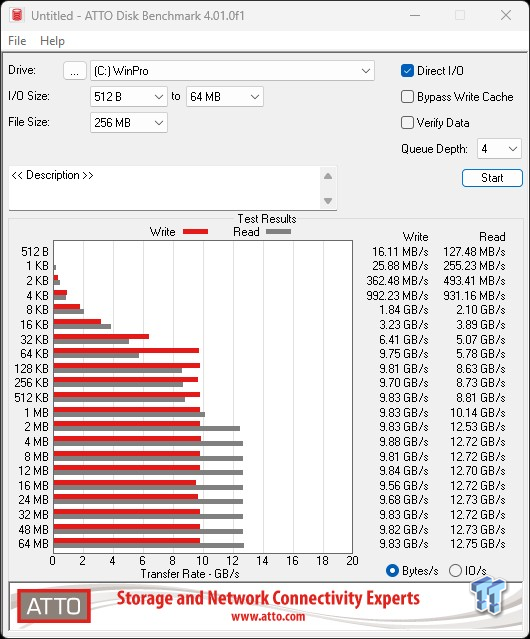
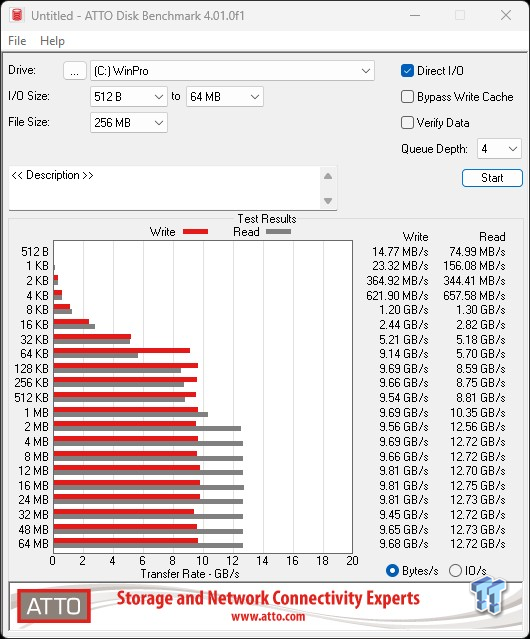
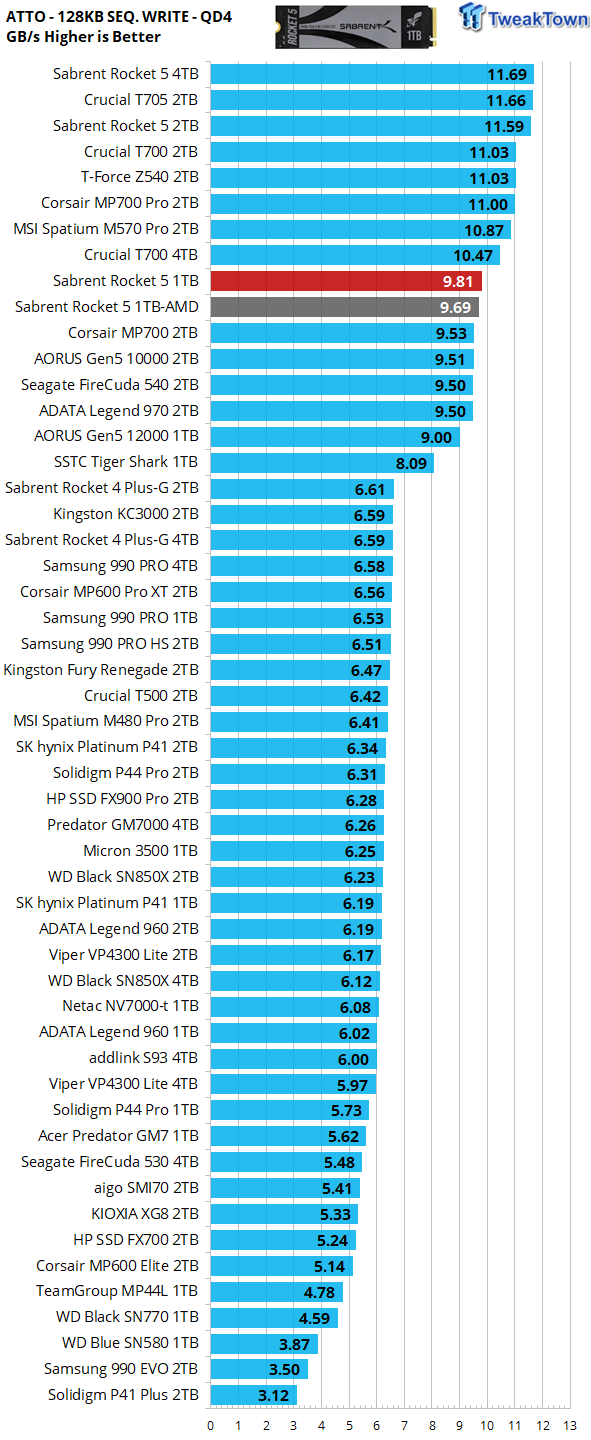
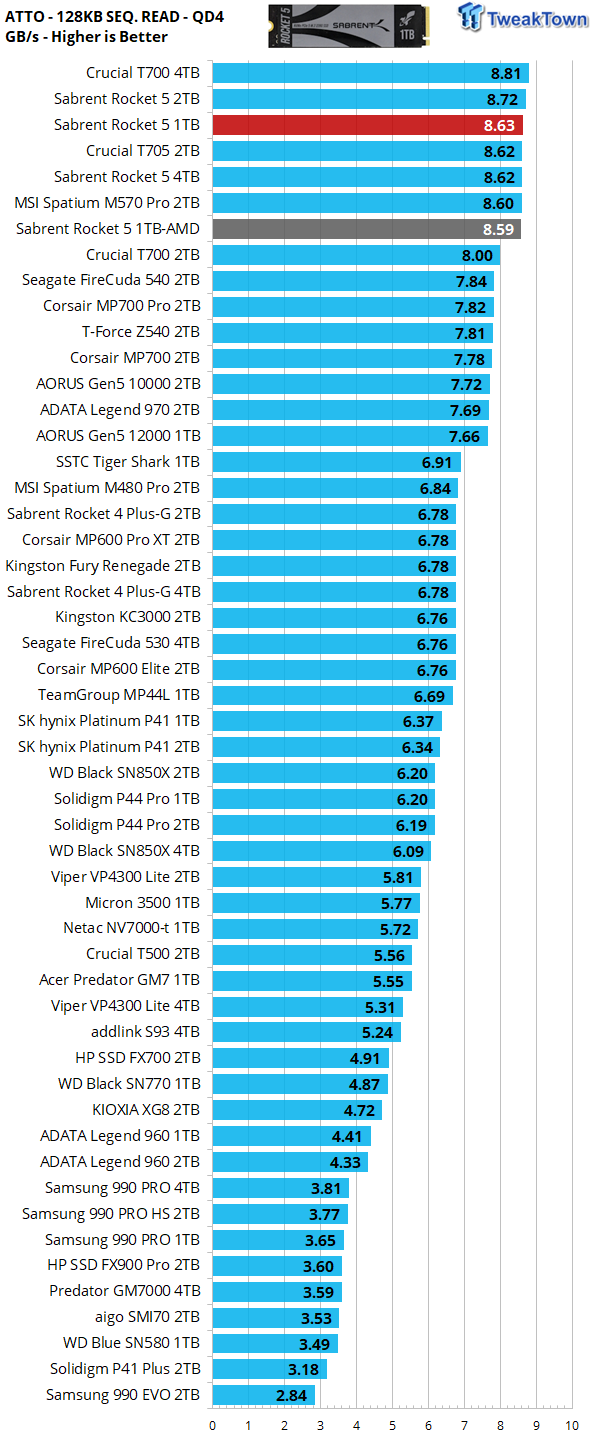
ATTO gives us a clear picture of what transfer sizes a particular SSD favors in terms of QD4 sequential throughput. We chart 128K transfers. At a queue depth of four, Sabrent's 1TB Rocket 5 favors sequential transfers of 2MB or larger when serving data to the host (reading) and 64K or larger when programming (writing) data.
Real-World Testing: Transfers, 3DMark SSD Gaming Test, PCM10 Storage
Transfer Rates
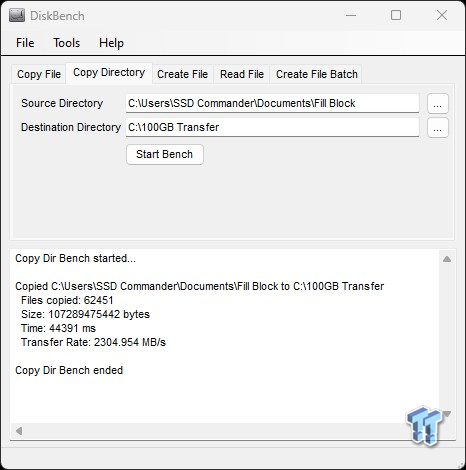
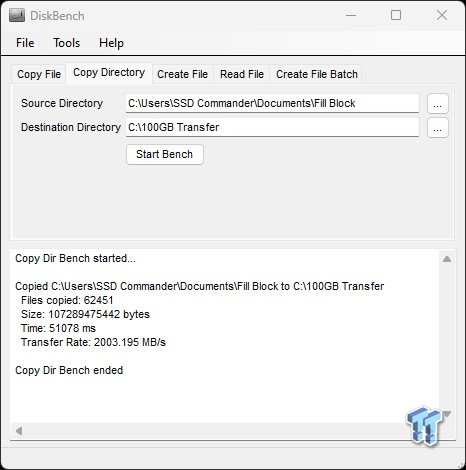
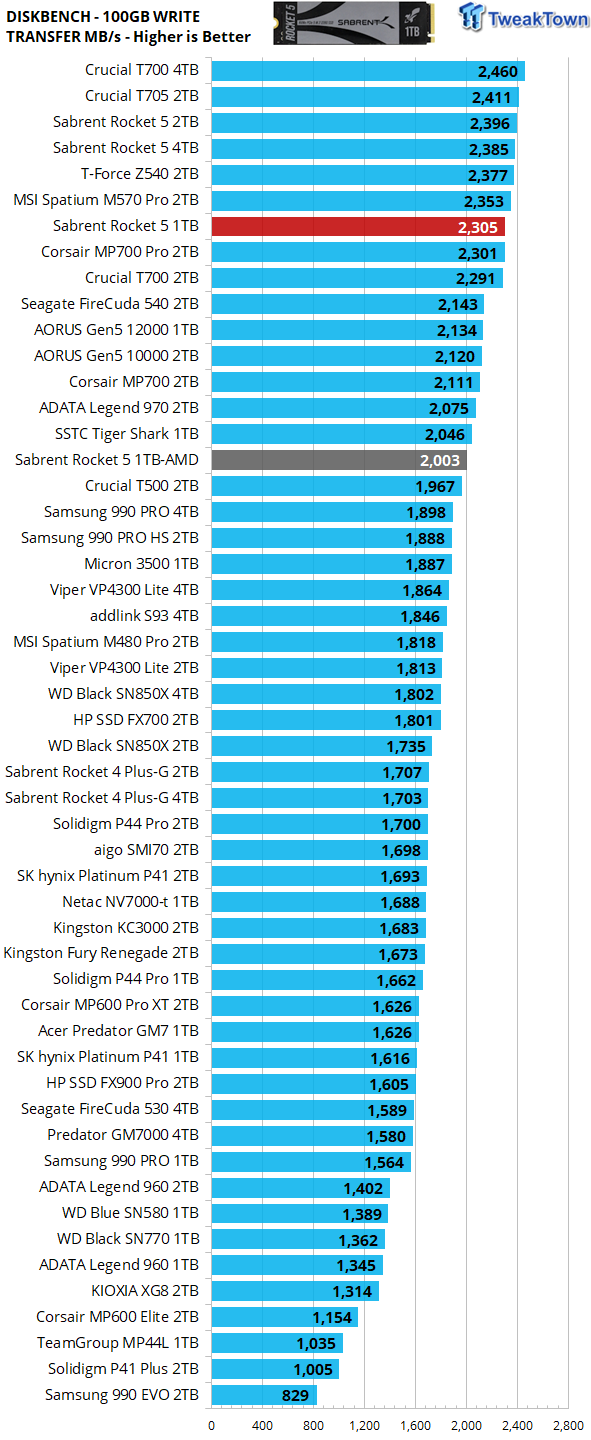
Our 100GB data transfer test is not your ordinary 100GB of data. Ours is a crushing mix composed of more than 62K files. Write performance random or sequential, is an infrequent operation, and as such, we do not consider it to be an important performance metric in the consumer space. An example being how many times is a game installed vs. how many times it's played. A new lab record for a 1TB SSD. Excellent.
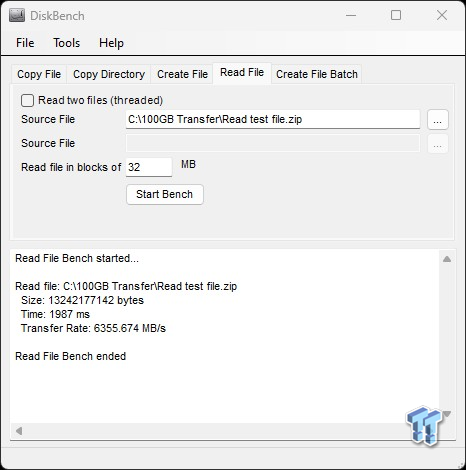
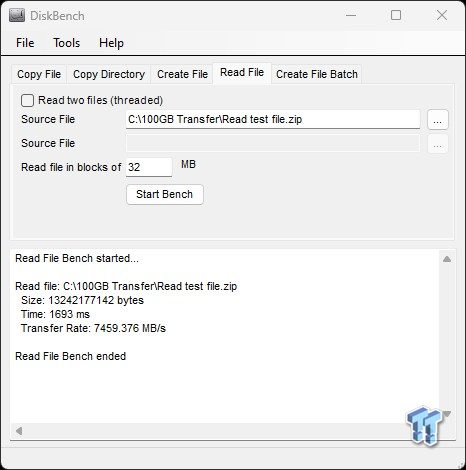
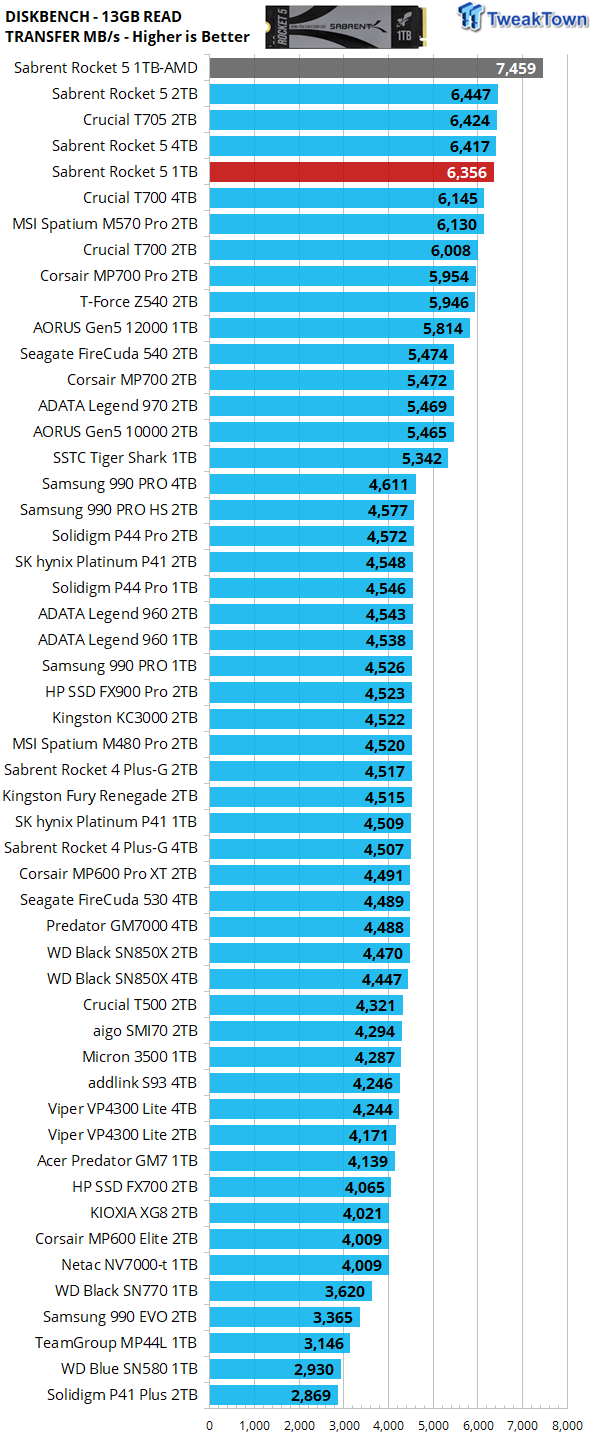
Unlike programming (writing) data, serving data to the host (reading) is always an important performance metric as it relates to the consumer space. Again, our 1TB speed demon delivers a lab record for its capacity point.
3DMark SSD Gaming Test
UL's newest 3DMark SSD Gaming Test is the most comprehensive SSD gaming test ever devised. We consider it superior to testing against games themselves because, as a trace, it is much more consistent than variations that will occur between runs on the actual game itself. This test is the same as running the actual game, just without the inconsistencies inherent to application testing. In short, we believe that this is the world's best way to test an SSD's gaming prowess and accurately compare it against competing SSDs. The 3DMark SSD Gaming Test measures and scores the following:
- Loading Battlefield V from launch to the main menu.
- Loading Call of Duty Black Ops 4 from launch to the main menu.
- Loading Overwatch from launch to the main menu.
- Recording a 1080p gameplay video at 60 FPS with OBS (Open Broadcaster Software) while playing Overwatch.
- Installing The Outer Worlds from the Epic Games Launcher.
- Saving game progress in The Outer Worlds.
- Copying the Steam folder for Counter-Strike Global Offensive from an external SSD to the system drive.
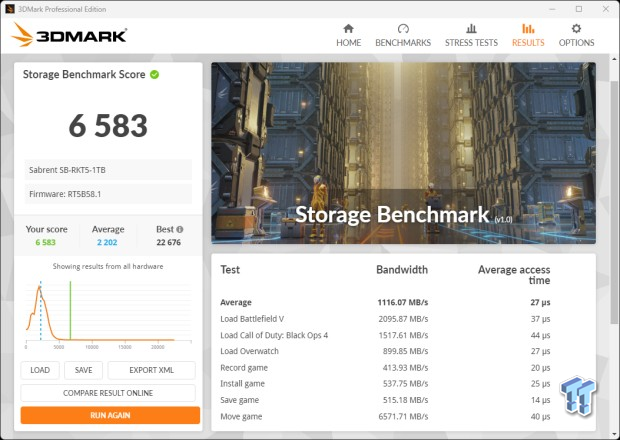
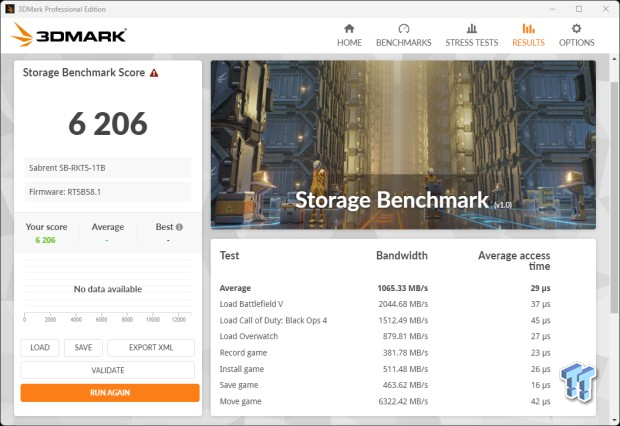
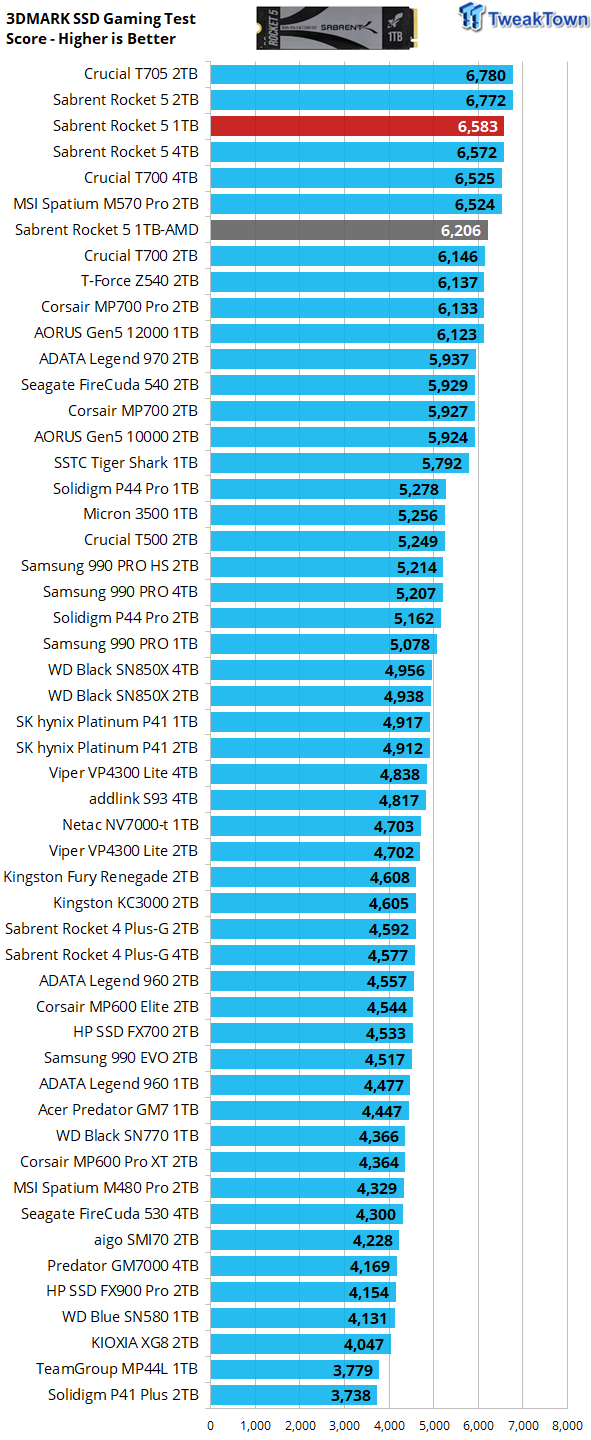
Gaming is a performance metric that matters to most DIY consumers, especially for the enthusiast crowd that TweakTown caters to. Now we've reached the point where results start to matter as they are a direct reflection of user experience. This is the new standard in gaming performance. And as previously mentioned, Sabrent's Rocket 5 SSDs come with Phison's exclusive I/O+ DirectStorage optimized technology baked right in. With it, a properly equipped PC can load up to 60% more gaming data with 99% less CPU utilization. Amazing. Again, and this time where it really matters, our 1TB contender gives us a bit more than its 4TB sibling while simultaneously setting another lab record for the 1TB capacity point. Outstanding.
PCM10 Storage Tests
PCMark 10 Storage Test is the most advanced and most accurate real-world consumer storage test ever made. There are four different tests you can choose from; we run two of them. The Full System Drive Benchmark and the Quick System Drive Benchmark. The Full System Drive Benchmark writes 204 GB of data over the duration of the test. These tests directly correlate with mainstream user experience.
PCMark 10 Full System Drive Benchmark
This test writes 204GB data and covers a broad range of common consumer tasks, including booting Windows 10, file transfers, Adobe and Office applications, and startup times for games including Battlefield V, COD Black Ops 4, and Overwatch. Unlike synthetic numbers, this is comprehensive real-world data which is why we use it to rank SSDs in terms of user experience.
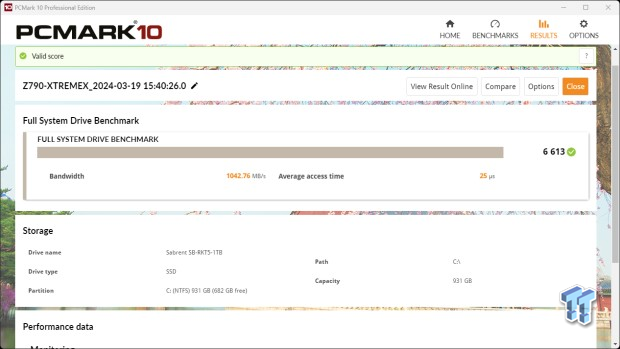
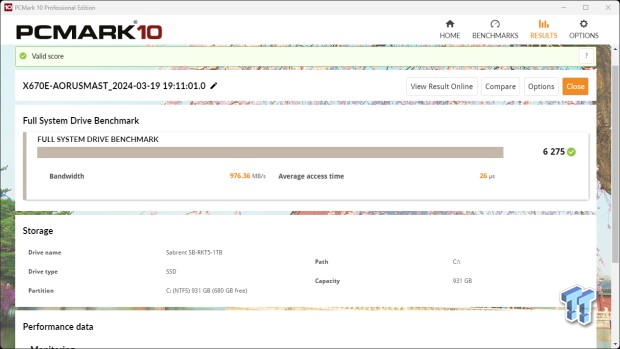
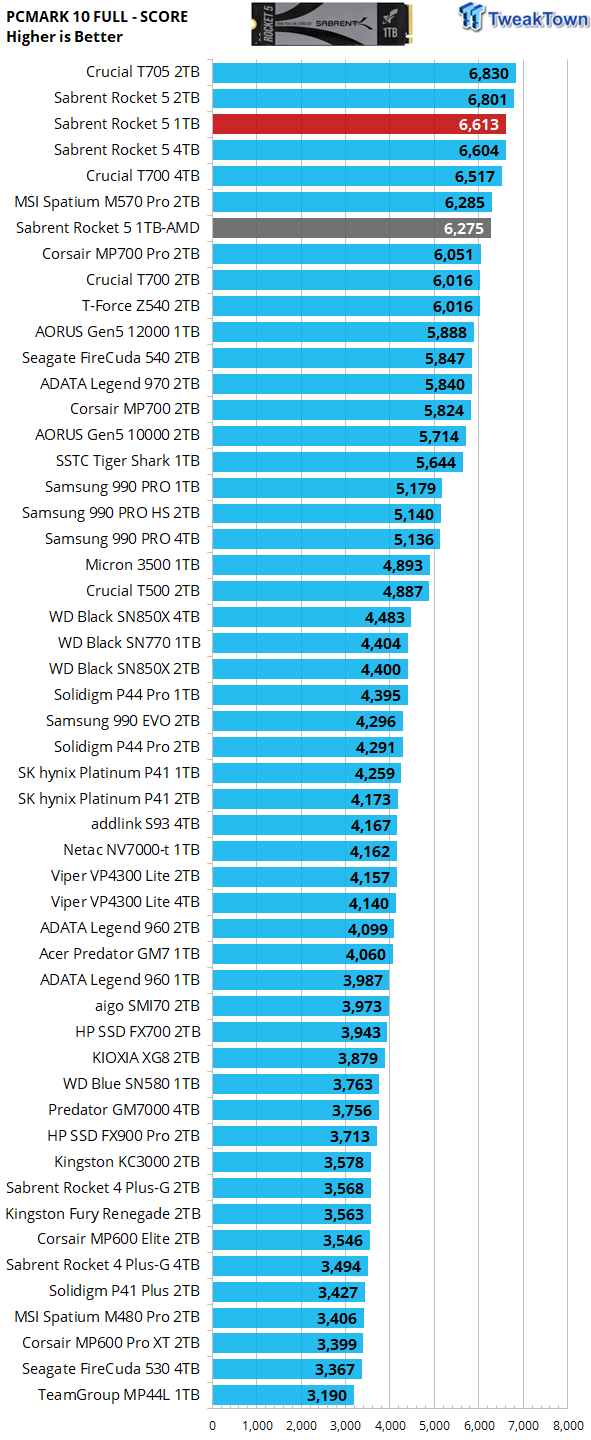
Again, the third best performance we've ever recorded. Again, higher performance than the 4TB Rocket 5, and again a new lab record for a 1TB flash-based SSD.
PCMark 10 Quick System Drive Benchmark
The Quick System Drive Benchmark writes 23 GB of data over the duration of the test.
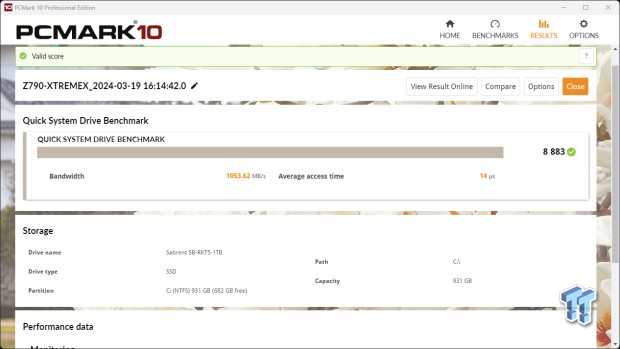
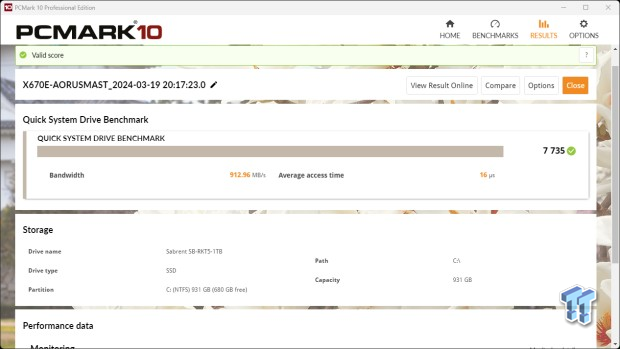
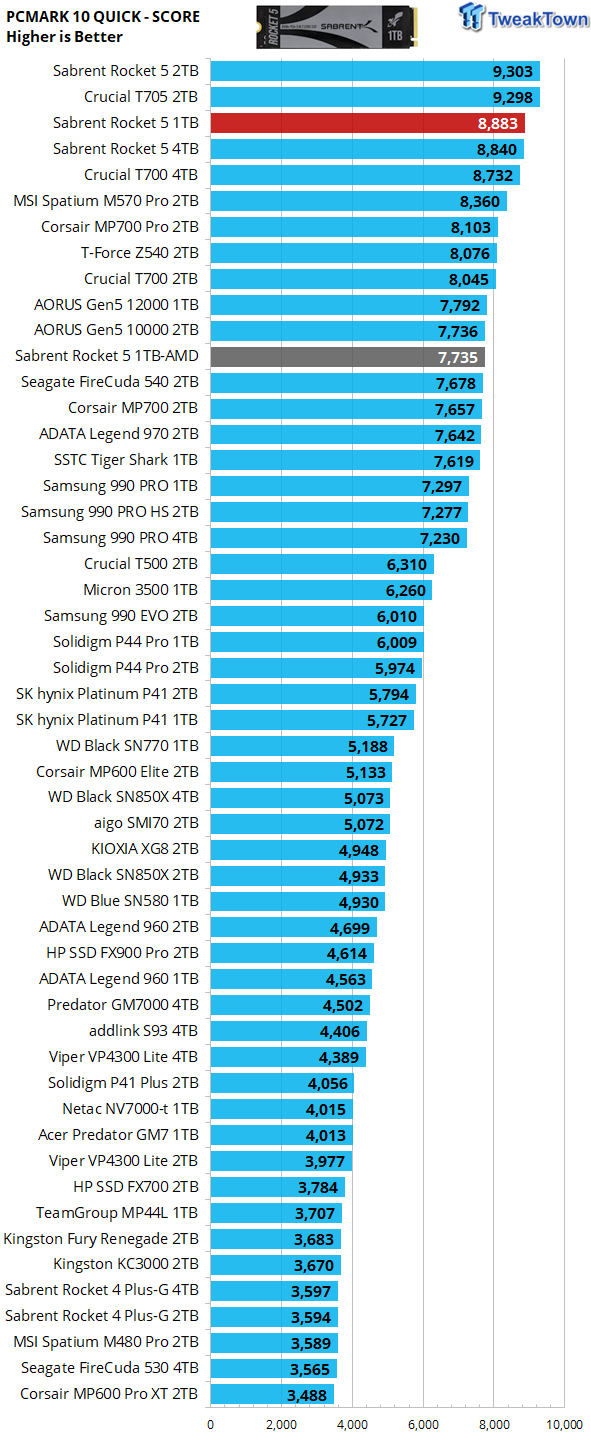
And with this, we can confirm that Sabrent's Rocket 5 is indeed the world's highest-performing 1TB flash-based SSD.
Final Thoughts
Sabrent is back doing Sabrent things, as perfectly exemplified by its Rocket 5 1TB PCIe Gen5 SSD. Unsurprisingly, and just as it was with its two higher capacity siblings, the 1TB Rocket 5 proved it is currently the world's most powerful SSD at its respective capacity point. We love this SSD because it gives budget-restricted enthusiasts a lower-cost path to PCIe Gen5 storage performance supremacy.
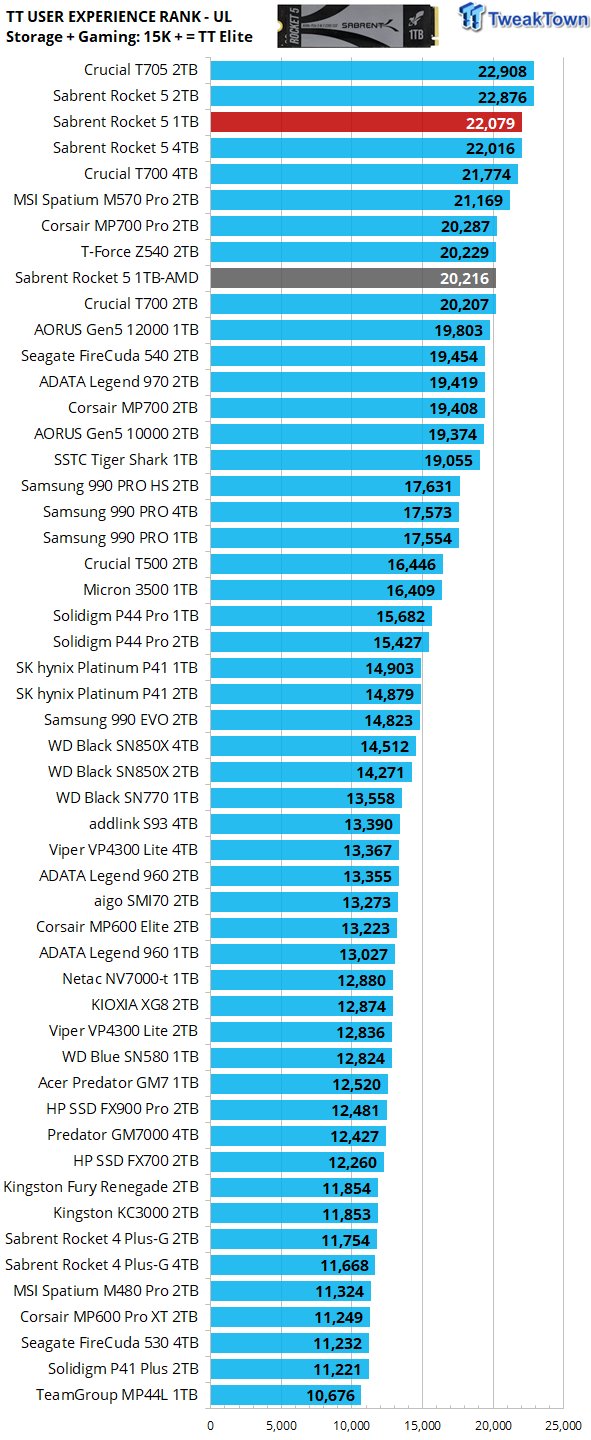
We rank SSDs in terms of overall user experience (performance where it matters most) as expressed by PCMark 10 storage and 3DMark gaming storage tests. Currently, we consider a user experience score of 15K or more to verify an SSD as a TweakTown Elite performer. And there you have it. Third highest user experience score we've ever attained from a flash-based SSD. As you can see, when it comes to performance that matters, the lower spec'd 1TB Rocket 5 offers the same or better real-world performance as the 4TB model.
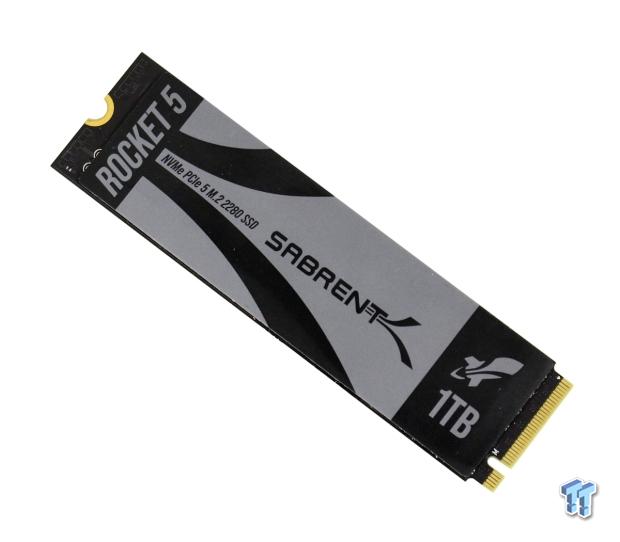
Sabrent's Rocket 5 1TB offers a more affordable path to the ultimate in flash-based storage and has earned our highest award: Editor's Choice.

